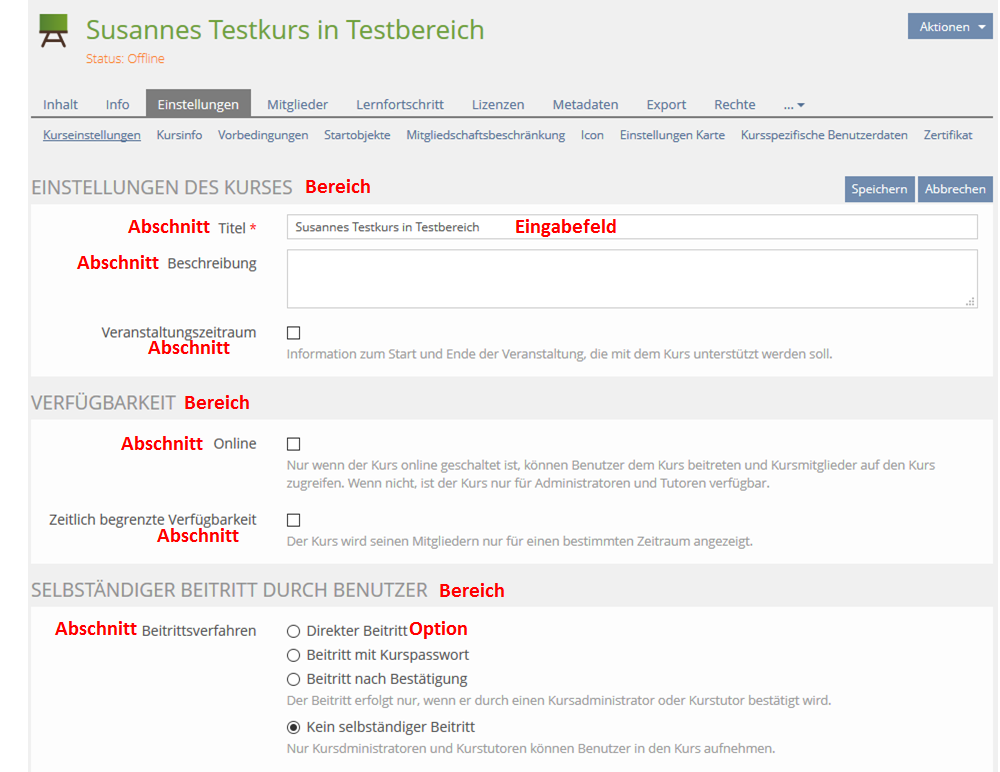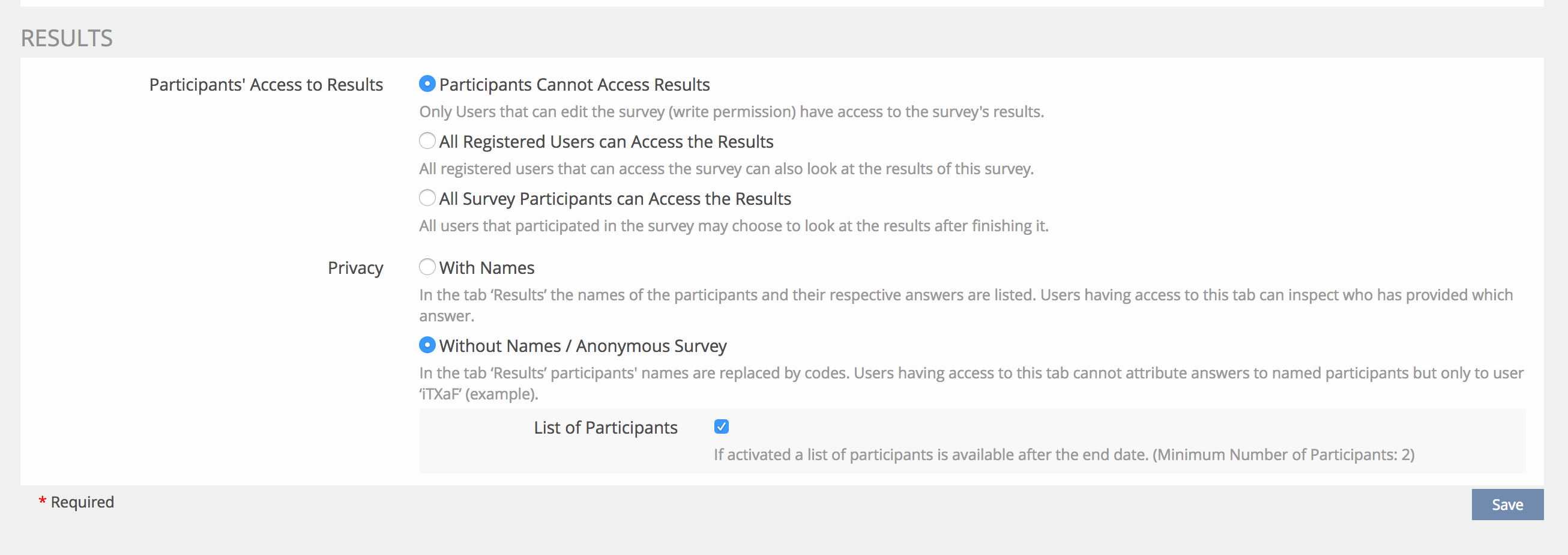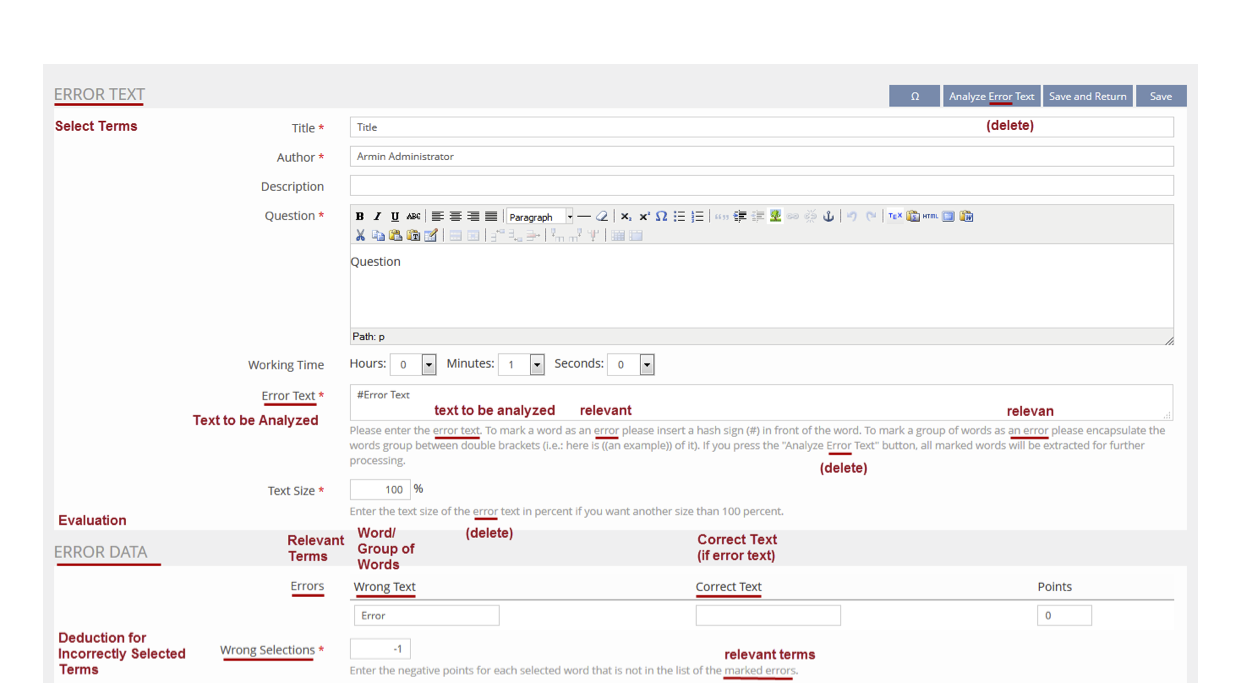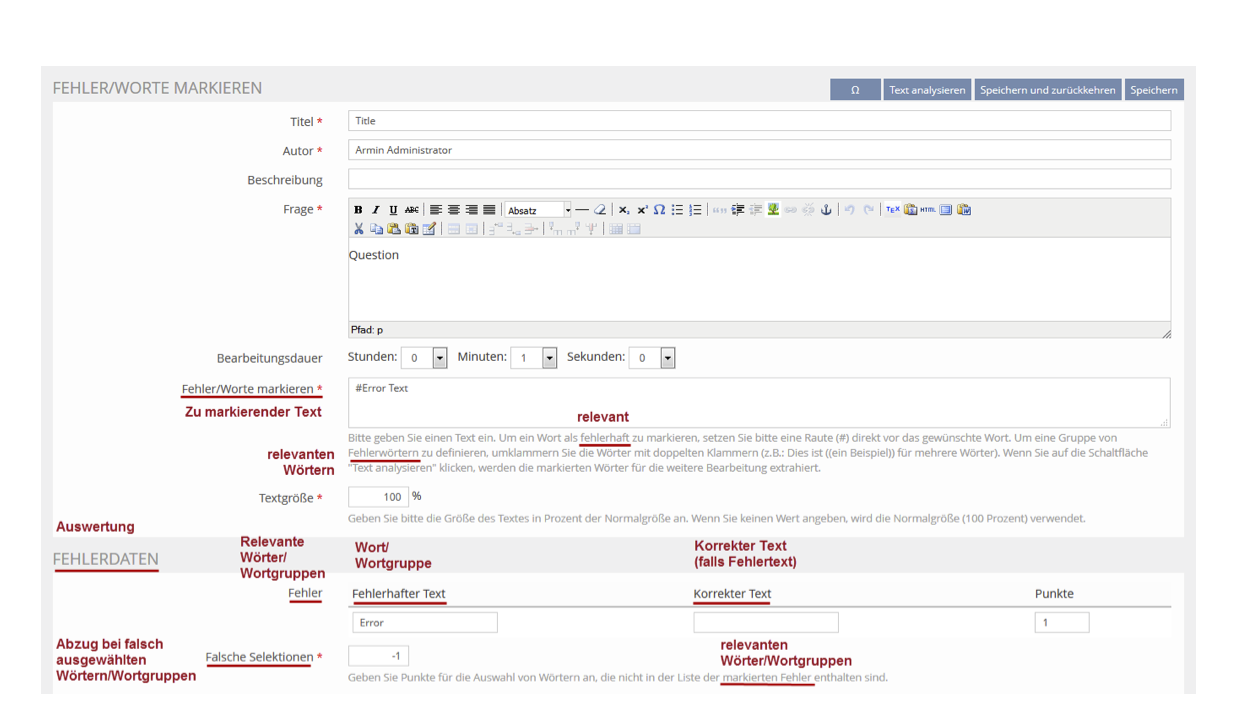Feature Wiki
Tabs
Suggested Changes in Labels for 5.3 and 5.4
Page Overview
[Hide]Go to chapter "Implementation" to see which changes made it into ILIAS.
1 Decided and Rejected
Should we switch from "Reiter" to "tabs" in german language? Editorial Team is slightly inclined to kep "Reiter", it is proper german plus the change would be a lot of work
Suggestion by Florian Suittenpointner to rename the test type "Error Text" to "Select Terms", see Mantis #20192. This would enhance the scenarios for such a test type.
Florian Suittenpointner: At least in German, "Error Text" questions are called "Fehler/Worte markieren" ("Mark errors/words").
This refers to the fact that this question type cannot only be used to present to participants sentences with errors (to be found): You can also ask participants to mark words according to other criteria ("Mark the adjective").
Against this background, it may be misleading that there are language variables like "Fehlerdaten", "Fehler", "Fehlerhafter Text" and "Korrekter Text" ("Error Data", "Errors", "Wrong Text" and "Correct Text").
So, either the German title of that question type should be brought in line with the English one or the entire wording outlined above is redesigned, serving non-error scenarios, too.
Maintainer Objections: When thinking about the changes related to the available functionalities of the question type in whole, there came up some smaller conceptional issues, that are described in a comment in the discussion chapter below.
( jump down to objection )
Heyser, Björn [bheyser], July 18th, 2017:
From the maintainers point of view, there are no technical objections against revising the labels to the assessment question type "Error Text" according to the suggestions. The conceptional argumentation for this request is fully consistent and valid. All aspects of this question type seem to also match when it gets relabled consistently.
Indeed I mentioned some small issues we should discuss, because of the fact that terms that are to be mached for any other reason than to identify an error, the field for "correct word/term" remains empty. The corresponding field even gives this like advice.
For a better understanding i prepared a short film that points on the weakness that is caused by empty fields for correct terms:
I forgot to point on a solution that could solve the issue with best solutions: Introduce a setting to differ between the intentions the question is used for. Indeed the labels could also be chosen sensitive for the set intention, so existing labels could be kept for the "error term" intention. For the intention to check for the students skills to find/mark any kind of (non error) terms, other labels could be used automatically.
( jump up to suggestion )
2 Decided and Accepted
- "Grade" should be labled more aptly as "Passed"
- "Mark
Is in 5.2 >> EN | Should be in 5.3 >> EN | Is in 5.2 >> DE | Should be in 5.3 >> DE | |
|---|---|---|---|---|
Concept | Grade | Passed | Bewertung | Bestanden |
Drop-Down |
|
|
|
|
Concept | Mark | Grade | Note | Bewertung |
Editorial Team prefers "Mark"
In the User Data we ask to indicate "Gender" / "Geschlecht". These terms are loaded and we only use them to adress people in mails.
Change to "Salutation" / "Anrede"

The image shows the current usage of German terms for elements of SETTING FORMS in the Online Help. This usage is divergent from usage within the developer community:
Online Help | Bereich // no English translation | Abschnitt // no English translation |
Developers/KS | Abschnitt // Section | Feld // Setting |
Richard Klees remarks that there are forms that do not contain settings, but he could live with "Einstellung".
Suggestion:
- Streamline usage in German:
- Do NOT use: Feld
- DO use: Einstellung
- In consequence:
- Help texts OLD: Bereich / Abschnitt
- Help texts NEW: Abschnitt / Einstellung - but prefer naming the concrete interface element
- Geben Sie im AbschnittEinstellungen des Kurses im TexteingabefeldTitel einen neuen Titel ein.
- Aktivieren Sie im AbschnittEinstellungen des Kurses die CheckboxVeranstaltungszeitraum, um…
- Wählen Sie im AbschnittSelbständiger Beitritt durch Benutzer unter der EinstellungBeitrittsverfahren eine der Optionen aus.
- KS-Entry: Forms: https://www.ilias.de/docu/goto_docu_wiki_wpage_3889_1357.html
- KS-Entry: Titled Form Sections: https://www.ilias.de/docu/goto_docu_wiki_wpage_3890_1357.html
- KS-Entry: Form Settings: https://www.ilias.de/docu/goto_docu_wiki_wpage_3891_1357.html
- KS-Entry: Form Subsettings: https://www.ilias.de/docu/goto_docu_wiki_wpage_3892_1357.html
The Feature Group Period requires an improved german label.
In courses and groups there is a setting "Veranstaltungszeitraum" / "Course / Group Period": It is used to announce when something will actually happen, when people will meet and learn. The label "Veranstaltungszeitraum" was considered good enough. However the english label "Course / Group Period".
Suggestions are "Event Date" oder „Period of Activity“
- The accepted change from 'Gender' to 'Salutation' now requires a third option 'No salutation desired' for those who neither want to be adressed as Mr. nor Ms. I suggest to add a third option 'No salutation desired' / 'Keine Anrede gewünscht' in the registration and user administration. Related lang var would be
common#:#gender_n#.
3 Decided but Postponed
Löschen/delete: Wird eine Entität gelöscht, wird sie komplett aus dem System beseitigt oder - im Fall von Magazin-Objekten und Mails - in den Papierkorb gelegt.
Beispiele: Frage löschen, Bild löschen, Mail löschen, Testergebnisse löschen, [Objekt] löschen
Entfernen/remove: Eine Zuordnung wird aufgehoben.
Beispiel: Teilnehmer entfernen. Der Kurs bleibt bestehen und das Benutzerkonto aktiv, aber die Zuordnung des Benutzerkontos zum Kurs wird aufgehoben.
ENGLISH
Delete: If an entity is deleted, it is eliminated completely from the system or - in the case of repository objects and mails - put into trash.
Examples: Deleting a question of a test; deleting an image from the page editor; deleting a mail; deleting test results, deleting an object
Remove: A connection of two entities is dissolved without affecting any of the two entities.
Example: Removing a participant. The course is not deleted, nor is the user account. Only the assignment of the user to the course is being removed.
JourFixe, ILIAS [jourfixe], 18 DEC 2017: We accept the definitions in general. But we would like to postpone the label changes to 5.4 to have enough time to test possible side effects. A significant number of appearances need also to be changed on code level ('Remove' button vs. 'Delete' button).
4 Suggested changes in discussion
- Fabian Kruse for ILF: "Administrator" abschaffen.
- Die Bezeichnung „Administrator“ ist weder geschlechtergerecht noch präzise und sollte nicht mehr verwendet werden.
- Wir bevorzugen eine explizite Nennung der erforderlichen Rechte bzw. eine Referenzierung der technischen Betreuung bzw. der Kurs- und Gruppenbetreuung.
- Abgrenzen:
- Technische Betreuung: Seit ILIAS 5.1 werden Personen, die Benutzern bei technischen Fragen und Problemen helfen als "technische Betreuung" bezeichnet. Diese müssen nicht zwangsweise auch Administratoren sein. Es sollte daher im Interface und in der Hilfe zwischen Administratoren (definiert über die entsprechende Rolle) und der technischen Betreuung (definiert über die Benutzerliste unter Administration > Allgemeine Einstellungen > Kontaktinformation > Technische Betreuung) unterschieden werden.
- Kursbetreuung: Benutzer, die als Ansprechpartner für Kursteilnehmer zur Verfügung stehen.
- Konkrete Rechte: Wenn es um Zugriff auf bestimmte Bereiche in der Administration geht, sollten diese Rechte benannt werden.
- Die Bezeichnung „Administrator“ ist weder geschlechtergerecht noch präzise und sollte nicht mehr verwendet werden.
- Fabian Kruse for ILF: Def. "Akkordeon".
- Ein Akkordeon ermöglicht es, viele Informationen auf eine Seite im ILIAS-Seiteneditor zu packen, ohne dass diese dadurch unübersichtlich wird.
- Anstatt auf einer Seite immer alle Informationen direkt anzuzeigen, ordnen Sie diese in Akkordeonfächer, die mit einem Mausklick einzeln ein- und ausgeblendet werden können. Die Seite muss dafür nicht neu geladen werden, weshalb alle Fächer bei Bedarf schnell durchsuchbar sind. Durch das Ausblenden der jeweils nicht benötigten Inhalte wird die Seite übersichtlicher.
- Ein Akkordeon ermöglicht es, viele Informationen auf eine Seite im ILIAS-Seiteneditor zu packen, ohne dass diese dadurch unübersichtlich wird.
- Fabian Kruse for ILF: Def. "Aktionen-Menü"
- Verschiedene Funktionen, die ein Objekt in ILIAS betreffen, finden Sie im Aktionen-Menü. Ein reduziertes Aktionen-Menü kann innerhalb des Bearbeitungsmodus aller Objekte genutzt werden.
- Ein ähnliches Menü wird in ILIAS teilweise schlicht durch ein Dreieck (▼) dargestellt. Das ▼-Auswahlmenü kann für alle Objekte im übergeordneten Containerobjekt im Magazin aufgerufen werden, also beispielsweise in der Kategorie oder in dem Kurs, in dem das Objekt liegt.
- Nicht verwenden:
- Aktionenmenü
- Aktionsmenü
Is en | Should en | Is de | Should de |
|---|---|---|---|
Tab Members | Tab Participants | Reiter Mitglieder | Reiter Teilnehmer |
The umbrella term for course / group Members, administrators and tutors is "Members" | The umbrella term for course / group Members, administrators and tutors is "Participants" | Der Oberbegriff für Kursmitglieder, -administratoren und -tutoren ist "Mitglieder" | Der Oberbegriff für Kursmitglieder, -administratoren und -tutoren ist "Teilnehmer" |
Course Member Gallery | Gallery | Mitgliedergalerie | Galerie |
Umbrella term
- de = Beteiligte
- en = Persons Involved
- de= Teilnehmer
- en = Participants
- Mitglied as umbrella term for all persons who are at least enrolled in one group or course role - and therefore appear in the member administration. We already use this term in this way, e.g.: Mitglieder tab, Mail an Mitglieder, Mitgliedergalerie,
- Teilnehmer is a good new term for those who represent the target group of a group or course - the learners. Check this against your daily language use: "Ich habe an einem Kurs teilgenommen." "Alle Kursteilnehmer treffen sich am Dienstag zur ersten Sitzung." etc...
- Related terms in English are Member and Participant.
ILF, 2017-07-19: Generic term "User" seems like a possibility, but also like a cop-out for lack of a better word. ILF members AT and FK still believe that "Persons Involved/Beteiligte" is as descriptive as it gets. We’re not a fan of "Mitglied".
AT will ask some of her customers for a better generic term.
The star system for rating is labeled "Bewertung" in German as is the "Grade" in tutor grading. This should be resolved but Alexandra has no idea how.
Kunkel, Matthias [mkunkel], July 21, 2017: Language variable for 'Results' on tab 'Participants' cannot be relabeled as this lang var is also used in tab 'Settings', see screenshot. A new lang var needs to be introduced by the survey maintainer. And I noticed a conflict with the sub-setting 'List of Participants' on the screen below. It looks as if the change of the sub-tab 'List of participants' to 'Access codes' in 5.3 has not been streamlined properly.

Is EN | ENShould EN | Is DE | Should DE |
|---|---|---|---|
Object: Exercise | Object: Assignment | Objekt: Übung | Objekt: Aufgabe |
Sub-item: Assignment | Sub-Item: Task | Sub-Item: Übungseinheit | Sub-Item: Auftrag |
Kunkel, Matthias [mkunkel], June 30, 2017: Chap 1.3: I changed the suggestion for "Aufgaben" to "Aufgabe" (object) and for the sub-item from "Aufgabe" to "Auftrag". This will avoid misunderstandings and confusion: "Eine Aufgabe kann aus mehreren Aufträgen bestehen" - statt "Ein (Objekt) Aufgaben kann aus mehreren Aufgaben bestehen".
5 Please decide on JF
Eckige Kästchen, die aktiviert oder deaktiviert werden um eine Einstellung an- oder abzuschalten. ILIAS muss standardmäßig keine Wahl vorgeben. Es ist möglich, mehr als eine oder alle Checkboxen einer Einstellung zu aktivieren oder zu deaktivieren. Alle Änderungen an Checkboxen müssen gespeichert werden, um einen Effekt zu haben.
Zugehöriges Verb:
- Aktivieren/deaktivieren
- Klicken (einer Schaltfläche)
- Auswählen (eines Radio-Buttons)
- Aktivieren Sie die Checkbox Online, um den Kurs verfügbar zu machen.
- Klicken Sie auf die Schaltfläche Speichern.
JourFixe, ILIAS [jourfixe], 23 APR 2018 : Suggestion is accepted!
Ein Objekt, das ein anderes Objekt enthalten kann. Wird ein Container-Objekt gelöscht/verschoben/…, werden auch alle enthaltenen Objekte gelöscht/verschoben/usw.
In ILIAS gibt es folgende Container-Objekte:
- Kurse
- Gruppen
- Ordner
- Kategorien
- Kurzform: Container
- Objekteblock, Studienprogramm, Sitzung: Diese enthalten keine Objekte, sondern bündeln sie zur besseren Übersicht.
JourFixe, ILIAS [jourfixe], 23 APR 2018 : Studienprogramme und Org-Einheiten sind ebenfalls Container. Vorschlag bitte überarbeiten.
NEU: Der erste Unterreiter eines Einstellungsreiters heißt immer „Allgemein“:
- Reiter „Einstellungen“
- Unterreiter „Allgemein“ (Englisch: „General“)
- Überschrift „Einstellungen des Kurses“
- Unterreiter „Allgemein“ (Englisch: „General“)
- Alle Unterreiter des Reiters "Einstellungen" (z.B.) im Kurs enthalten Kurseinstellungen.
- Die „Einstellungen“ werden in den anderen Unterreitern auch nicht erneut genannt (also z.B. nicht „Icon-Einstellungen“).
Beispiele:
- Einstellungen der Kategorie
- Einstellungen des Kurses
JourFixe, ILIAS [jourfixe], 23 APR 2018 : Suggestion is accepted!
Menüs enthalten Einträge.
Nicht verwenden:
- Link
- Item
- Element
- Option
- Verwenden: Wählen
- Nicht mehr verwenden (Deprecated): Klicken
- Nicht verwenden: Aktivieren, Öffnen
- Online-Hilfe: Wählen Sie im Menü "Persönlicher Schreibtisch" den Eintrag "Übersicht".
JourFixe, ILIAS [jourfixe], 23 APR 2018 : Suggestion is accepted! A modification might be necessary according to results of page layout revision for 5.x.
ILF suggests to rope in and streamline usage of "mode" and "type" in ILIAS. This would bring about several changes in the interface, but would contribute to a clearer language in the whole system.
We agreed on two working definitions. If JF agrees, we will look over the language file to improve usage and identify any problematic items. If mandated by JF, Alexandra Tödt would prepare this for ILF.
@JF: Should we streamline the labels based on these two working definitions?
Working Definitions suggested by ILF
Modus: Die Änderung eines Modus hat erhebliche Auswirkungen (neue Reiter werden eingeblendet, starke Verhaltensänderung des Objekts), aber ist rekonfigurierbar. Aufgrund ihrer hohen Bedeutung sind objektbezogene Modus-Konfigurationen im Reiter „Einstellungen“ direkt unter Titel/Beschreibung zu finden und nicht weiter unten im Formular.
Beispiel: Nachkorrekturmodus in Administration → Test und Assessment: Blendet neuen Reiter ein, kann geändert werden.
Typ: Die Wahl eines Typs in ILIAS wird immer beim Anlegen eines Objekts (oder einer anderen Entität) getroffen und ist nach der Wahl endgültig und nicht mehr änderbar.
Beispiel: Der Umfragetyp "360°-Feedback" bleibt immer gleich und kann nach dem Anlegen nicht mehr geändert werden.
ENGLISH
Mode: Changing a mode has serious consequences in the user interface (e.g. new tabs are shown; object behaves differently), but it is possible to reconfigure it later on. Because of these implications, object-related mode settings should be presented prominently in the settings tab right below title/description (and not further down in the settings tab).
Example: "Nachkorrekturmodus" in German Administration → Test and Assessment: Introduces new tabs, can be adapted later on.
Type: The choice of a type has to be made during the creation of an object and cannot be changed anymore after the fact.
Example: The survey type "360° Feedback" always stays the same and cannot be changed anymore after the creation of the survey.
JourFixe, ILIAS [jourfixe], 23 APR 2018 : Suggestion is accepted!
Implementation of Changes
- The new definitions are to be used in any new implementations after approval by JF.
- Alexandra Tödt and Fabian Kruse take care to improve the wording of existing implementations in the lang file.
- Changes that require code modification will be collected by us and presented to JF in a feature request. Maintainers can ask for funding where required. We assume that a mere reordering of a setting form (such as our suggested "mode settings below title/description") should not be prohibitively expensive.
6 Contact
- Changes suggested by: Tödt, Alexandra [atoedt], Kunkel, Matthias [mkunkel], Kruse, Fabian [Fabian], …
- Maintainer: Kunkel, Matthias [mkunkel] (Language Handling), Meyer, Stefan [smeyer] (Course, Group, Learning Progress), Killing, Alexander [alex] (Exercise, Survey), Heyser, Björn [bheyser] (Test & Assessment)
- Implementation by: …
7 Discussion
Ad 1.1:
- We keep "Reiter" and reject "Tab".
- We accept to change "Grade" to "Passed" and the status changes as described above.
- Please find another term for "Rating" in German.
- We accept the change from "Gender" to "Salutation"
- We accept the change from "Bereich" to "Abschnitt" and from "Abschnitt" to "Einstellung".
- We prefer "Gallery" instead of "Group member.. or participants gallery"
- We postpone a discussion of renaming all course/group members to participants. We are looking for a better term for the current "member" in the sense of a "learner". In our general understanding a "participant" is the person who takes the course but not the one who administrates it.
- Ad 2.1: We couldn't agree on a generic term for all target groups in courses/groups and ask the Online Help team to present the issue at the DecConf for further discussion and feedback. Note: The new term should also fit in the context of sessions.
- Ad 2.1.2: "Group / Course Period" should be changed to "Period of Event".
- Ad 2.2: The tab should keep the name "Participants". The sub-tab should be renamed to "List of Participants". The table gets a headline "Participants".
- Ad 2.3: Suggestion postponed to JF when Björn Heyser will attend the meeting.
- Ad 2.4: We ask the Online Help team to present the issue at the DecConf for further discussion and feedback.
JourFixe, ILIAS [jourfixe], Oct 23, 2017: We agree with the suggestion to implement a third option 'No salutation desired' / 'Keine Anrede gewünscht' in registration and user administration. A related lang var has already been committed by Kunkel, Matthias [mkunkel]. We do not understand the current suggestion for replacing the term 'Administrator'. Please make a suggestion how to substitute ourse administrator or group administrator.
- "Checkbox aktivieren" : accepted
- "Container" : refused, needs revision
- "Einstellungen » Allgemein" : accepted
- "Einträge" in Menüs : accepted
- "Type" vs. "Modus" : accepted
8 Implementation
- 'Salutation'/'Anrede' replaces 'Gender'/'Geschlecht'
- 'Ms.'/'Frau' replaces /'weiblich'
- 'Mr.'/'Mann' replaces /'männlich'
- 'No salutation desired'/'Keine Anrede gewünscht' added as new third option (still needs to be added to GUI class)
- 'Period of Event' replaces 'Group Period and 'Course Period'.
Last edited: 28. Jan 2022, 11:18, Kunkel, Matthias [mkunkel]


